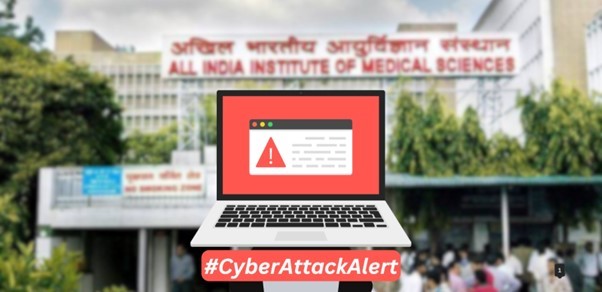The increasing reliance on digital infrastructure has heightened the risk of cyberattacks for organizations worldwide, including critical institutions like healthcare facilities. A particularly alarming example was the cyberattack on the All-India Institute of Medical Sciences (AIIMS), one of India's most prestigious healthcare institutions. This significant ransomware attack disrupted services at the premier medical institute, underscoring the urgent need for robust cybersecurity strategies in India’s healthcare sector.
“ AIIMS Cyber Attack: A Grave Wake-up Call for India's Safety"
This incident not only compromised sensitive patient data but also undermined public trust and highlighted the systemic weaknesses in protecting critical digital assets. It serves as a wake-up call for stakeholders to reassess existing security frameworks and implement comprehensive measures to mitigate future risks. Addressing these challenges requires substantial investment in advanced technologies, fostering cybersecurity awareness, and ensuring coordinated response mechanisms. As cyber threats grow more sophisticated, strengthening defenses and prioritizing resilience has become imperative for safeguarding critical infrastructure and maintaining public confidence in essential services.
AIIMS cyber-attack jolted India's healthcare system to its core and spotlighted its weaknesses. The incident, allegedly a ransomware attack, posed serious disruptions at hospitals and threatened sensitive patient data. Ransomware attacks operate by encrypting a victim’s data and demanding payment for its release. In this instance, they struck at a critical healthcare provider, a further reminder of the potential threat that these types of assaults pose to the health and safety of the general public. The increasing reliance on digital infrastructure has heightened the risk of cyberattacks for organizations worldwide, including critical institutions like healthcare facilities. A particularly alarming example was the cyberattack on the All-India Institute of Medical Sciences (AIIMS), one of India's most prestigious healthcare institutions. This significant ransomware attack disrupted services at the premier medical institute, underscoring the urgent need for robust cybersecurity strategies in India’s healthcare sector.
The ramifications of the AIIMS cyber-attack were severe. Patient records were frozen, rendering them inaccessible, which led to treatment delays and raised concerns about compromised privacy. This incident also underscored the urgent need for better preparedness and robust cybersecurity measures to protect our healthcare systems and ensure the safety and security of patient data.
India's large population and rapidly growing digital ecosystem have made it a significant target for cybercriminals. The healthcare sector in the country has emerged as the most targeted, reflecting a similar global trend. Recent statistics reveal that the number of cyberattacks worldwide rose by a staggering 38% in 2022 compared to the previous year, highlighting the escalating scale and sophistication of these threats. With the emergence of advanced technologies like artificial intelligence (AI) and the Internet of Things (IoT), the healthcare sector's vulnerability has grown even more. While these innovations promise transformative benefits, they also expand the attack surface for bad actors. These threats are evolving at such an accelerating pace that healthcare organizations are struggling to keep up. Many do not have the technical infrastructure and financial means to create and maintain robust cybersecurity systems.


The AIIMS cyber-attack highlighted several key lessons for India's cybersecurity landscape such as:
• Regular data backups: One of the most salient takeaways from the AIIMS cyber-attack is the importance of regular data backups. It emphasized the importance of regular data backups to mitigate the impact of ransomware attacks. Backups enable organizations to restore their systems and data to a previous state, minimizing downtime and financial losses.
• Robust security solutions: Healthcare organisations need to invest more in robust security solutions. the incident reinforced the need for robust incident response plans and cybersecurity awareness training for healthcare professionals. Timely identification and containment of cyber threats are crucial in preventing extensive damage. Such steps are necessary to prevent cyber-attacks from taking place in the first place.
• Enhancing cyber-education: Healthcare organisations should offer comprehensive cyber-education and pieces of training to their employees, in order to create a secure, cyber-savvy culture in the organisation. This should involve not only talking about well-being but also explaining the intricacies of cyber security and the potential risks associated with it.
The AIIMS cyberattack underscores critical lessons for strengthening India's cybersecurity framework. Addressing cybersecurity challenges requires a comprehensive approach, combining substantial investments in advanced technologies and workforce training to safeguard our healthcare infrastructure. Proactive measures are essential to shield the sector from future threats, rather than reacting to crises after they occur. Healthcare organizations must collaborate with government bodies and industry leaders to establish partnerships that drive impactful cybersecurity initiatives. Such collaboration is vital for building a resilient healthcare ecosystem that protects sensitive data, ensures patient safety, and upholds public trust.
By prioritizing cybersecurity and adopting a forward-thinking strategy, India can safeguard its digital assets, protect citizen privacy, and enable innovation in an increasingly digital world. Together, let us work towards creating a secure and resilient digital India.




